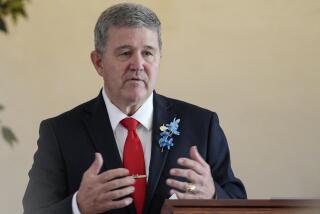Red-State Seats Tricky Fruit to Pluck
STAUNTON, Va. — In the Republican-leaning state of Virginia, the political climate has rarely been as favorable for Democrats as it is in this year’s gubernatorial election.
Outgoing Democratic Gov. Mark R. Warner is leaving office with a stratospheric 75% approval rating after an energetic term in which he closed a state budget shortfall, invested in schools and roads and presided over booming job growth.
Even some Republicans consider Lt. Gov. Timothy M. Kaine, the Democratic candidate to succeed Warner, a smoother and more skilled campaigner than GOP nominee Jerry W. Kilgore, the former state attorney general.
And, although President Bush comfortably carried Virginia last year, polls show his approval rating has slipped below 50% in the state.
Despite all of these tailwinds, Kaine is running at best stride for stride with Kilgore -- and perhaps a step behind him -- as they near the Nov. 8 election.
To a large extent, Kilgore has neutralized Kaine’s advantages by relentlessly portraying the Democrat as a liberal out of touch with state residents on social issues, especially the death penalty. In effect, Kilgore’s camp has pushed voters to see the race less as a referendum on current conditions than as an opportunity to express their values on cultural issues that the candidates could have debated as easily in 1995 or 1985.
In that way, the contest has crystallized the challenge Democrats probably will face next year trying to convert the disenchantment with Bush and the country’s direction evident in national polls into significant gains in congressional elections.
To regain control of Congress, Democrats would need to win Senate and House seats in Republican-leaning red states -- such as Montana, Missouri and Ohio -- and congressional districts that traditionally have been the most receptive to the same cultural issues Kilgore has spotlighted.
If Kilgore can retake the Virginia governorship for the GOP, it would prove “that red states [next year] are going to be tougher nuts to crack for Democrats, even under good circumstances, than they currently think,” said Larry J. Sabato, director of the Center for Politics at the University of Virginia.
Virginia is one of two states picking governors next month. The other is New Jersey, where Democratic Sen. Jon Corzine has a lead of seven to nine percentage points over Republican Douglas Forrester in recent surveys. Some earlier polls showed the race closer amid concerns about scandals in state government.
As oracles for the midterm elections a year later, the two states have a mixed record. Republican gubernatorial victories in Virginia and New Jersey in 1993 did foreshadow the sweeping GOP gains of 1994, but Democrats unexpectedly gained congressional seats in 1998 after Republicans held the governor’s office in both states again in 1997. And Democrats lost House and Senate seats in 2002 after winning the governorships in both states in 2001.
Still, in its arguments and strategies, the Virginia race may be anticipating currents that influence next year’s campaigns.
In one key respect, the Virginia governor’s race reverses the positions the parties almost assuredly will occupy in 2006. Though most Democrats next year can be expected to fan dissatisfaction over the country’s direction, Kaine is centering his campaign on widespread contentment about the performance of Warner, who state law limits to one term.
Successfully occupying the center on most issues, Warner won support from many Republican legislators for a large tax increase to pay for education and transportation after first squeezing out significant spending reductions to close a budget deficit he inherited. Warner is now exploring a bid for the 2008 Democratic presidential nomination.
Kaine, in his campaigning, emphasizes the traditional Democratic priority of education, promising to fund universal access to preschool for 4-year-olds. But Kaine has spiced his message with two distinctive notes.
Most surprisingly, Kaine has sought to energize his base by directly criticizing President Bush. Not long ago that might have been considered the political equivalent of bear-baiting in a state that Bush easily carried twice.
But Kaine thinks Bush’s stature has eroded to the point where the Democrat felt comfortable recently telling supporters in a Northern Virginia suburb that the state could send the White House “a powerful message about the direction of the country if we win this race.”
Kaine didn’t repeat that language a few days later in conservative Shenandoah Valley towns such as Staunton. But even Virginia Republicans worry that Bush’s sagging support might hurt Kilgore -- a judgment that some thought the candidate seconded when he did not attend a Bush speech in Norfolk on Friday because it was an official White House event, not a political one.
“One thing that is holding Jerry back is this national backdrop,” said one senior Virginia GOP strategist, who spoke on condition of anonymity when discussing the campaign.
Kaine’s other distinctive note has been a direct appeal to voters in the fast-growing outer suburb -- or “exurban” -- communities that have become a GOP stronghold not only in Virginia but around the nation. Kaine has proposed providing local governments authority to bar new housing and commercial development that they contend would overly clog their roads.
If that message helps Kaine trim the GOP margins in the exurbs, other Democrats probably will see it “as the road into this vote,” said Robert E. Lang, director of the Metropolitan Institute at Virginia Tech. “If it doesn’t work, it means ... the cultural issues still trump the pocket book, and that’s a bad message for Democrats in 2006 and 2008.”
Kilgore hasn’t relied solely on cultural issues in his campaign. “I’m the only candidate that stands for lower taxes, less regulation and an end to frivolous lawsuits,” Kilgore told supporters at a fundraiser last week.
But Kilgore, a former state and federal prosecutor who resigned as attorney general to focus on the race, has worked most aggressively to portray Kaine as a social liberal. In ads, Kilgore has charged that Kaine “supported gay adoption,” “vigorously supported gun control” and backed “abortion on demand.” This cultural offensive culminated in early October when Kilgore unleashed a barrage of emotional ads attacking Kaine over his opposition to the death penalty.
Kaine has responded by accusing Kilgore of misrepresenting his positions; he said that although his Catholic faith leads him to oppose the death penalty, he would enforce it. He also has talked more explicitly than most Democrats about his religious beliefs, including his experience as a Catholic missionary.
But Kilgore’s onslaught has taken its toll. When Kaine supporters at rallies across the Shenandoah Valley were asked to name the biggest obstacle he faced with their neighbors, they universally cited the social issues Kilgore has emphasized.
“That hits a raw nerve here,” Tom Dunaway, an educational technology consultant, said after Kaine spoke in Harrisonburg. “For a lot of people, those issues take precedence over anything else.”
Veteran Democratic consultant Steve Jarding, an advisor to Warner, said that Kaine’s views, primarily his opposition to the death penalty, had left him more vulnerable to these cultural attacks than other red-state Democrats might be next year.
But Jarding said that no matter who wins, the Virginia gubernatorial race should remind Democrats about their need to neutralize cultural issues even at a time when the national political environment seems to favor the party.
“If you let Republicans talk about this stuff,” said Jarding, “they will talk about it all day long, because they know they can win on it.”
*
Times staff writer Emma Vaughn contributed to this report.
More to Read
Get the L.A. Times Politics newsletter
Deeply reported insights into legislation, politics and policy from Sacramento, Washington and beyond. In your inbox three times per week.
You may occasionally receive promotional content from the Los Angeles Times.










